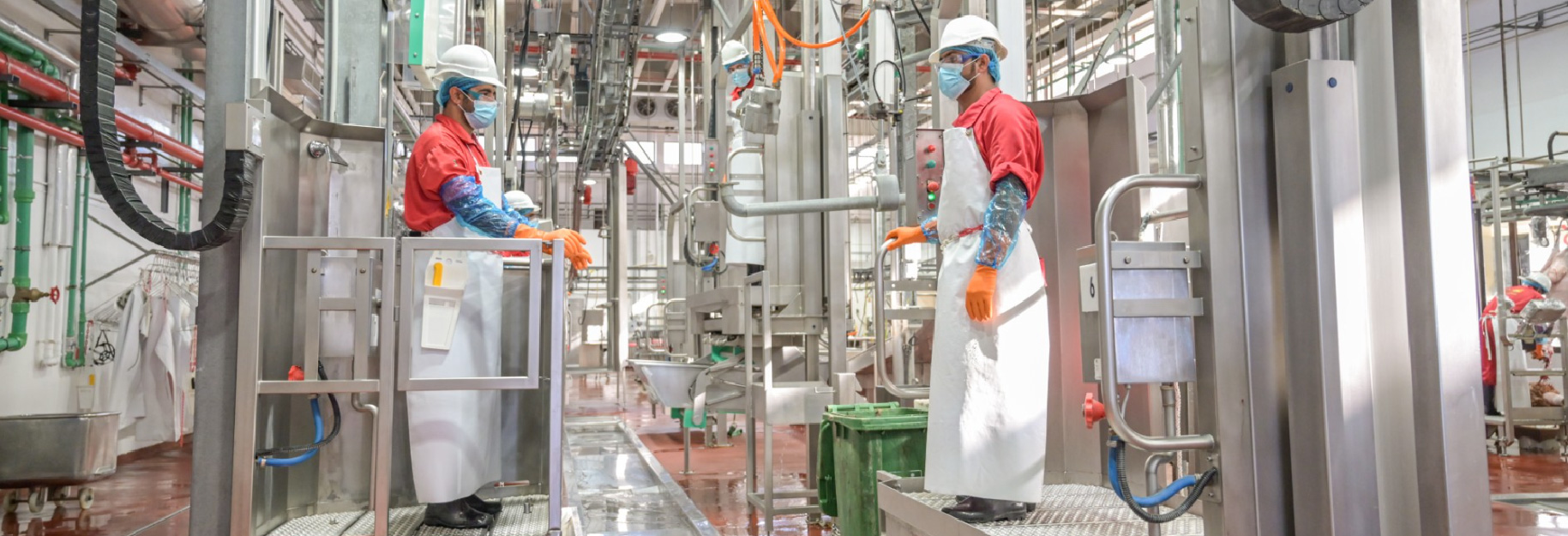
Abu Dhabi City Municipality confirmed that Abu Dhabi slaughterhouses will receive their customers during the holy month of Ramadan and Eid Al Fitr, as it has implemented several measures to improve the services provided by its slaughterhouses, including: the automated slaughterhouse in the Abu Dhabi Port area - Bani Yas slaughterhouse - Al Shahama slaughterhouse - Al Wathba slaughterhouse.
The Municipality emphasized its ongoing commitment to health and safety, ensuring the smooth and efficient operation of its slaughterhouses during the Holy Month and Eid Al-Fitr and at all times.
In this context, the Public Health Department of Abu Dhabi City Municipality organized educational workshops for slaughterhouse workers to enhance health and safety practices. These workshops covered topics such as general safety, customer interaction, managing work pressure during Ramadan, and the importance of adhering to best health practices to safeguard the well-being of both workers and consumers.
To ensure the readiness of the slaughterhouses, Abu Dhabi City Municipality conducted the necessary maintenance of equipment and facilities. The slaughterhouses will extend their working hours to meet the increased demand during Ramadan and Eid Al-Fitr. They will be open from 6:00 AM to 5:00 PM throughout the week, except on Fridays, when they will close from 11:30 AM to 2:00 PM to accommodate Friday prayers. This adjustment ensures the slaughterhouses can effectively meet the community's needs.
Abu Dhabi City Municipality anticipates a significant increase in the number of slaughtered animals during Ramadan this year, with over 80,000 animals expected to be processed, including sheep, goats, cows, and camels. The Automated Slaughterhouse is expected to handle 20,000 animals, Baniyas Slaughterhouse 30,000, Al Shahamah Slaughterhouse 25,000, and Al Wathbah Slaughterhouse 5,000.
The Municipality has bolstered the workforce to meet this increased demand with specialized slaughterhouse butchers. Additionally, each slaughterhouse will have a dedicated veterinary medical team responsible for conducting comprehensive inspections of animals before and after slaughter. These measures ensure that the meat meets the highest quality and safety standards for human consumption.
To improve services and reduce congestion, Abu Dhabi City Municipality encourages the use of electronic applications supervised by the Municipality, including "Thabehati," "Thabaih Al Jazeera," "Thabaih Al Emarat," and "Halal Mazarna." These applications allow customers to order and receive slaughtered animals, ensuring fast service conveniently and reduced waiting times. Orders placed through these applications are delivered directly to consumers' homes within three hours.
As always, Abu Dhabi City Municipality is committed to providing exceptional services to senior citizens and people of determination. During Ramadan this year, a service will be offered to receive animals, pay fees, and deliver slaughtered meat to customers while they remain in their vehicles, ensuring their comfort.
Regarding the benefits of preparing slaughtered animals in Abu Dhabi slaughterhouses, the Municipality confirmed that preparing slaughtered animals in its facilities achieves numerous benefits, including adherence to Islamic slaughter practices, comprehensive veterinary inspections, ensuring that butchers are free from infectious diseases, and early detection of epidemic diseases in livestock.
Furthermore, the Municipality is committed to adequately disposing waste, maintaining a clean and healthy environment while preserving the city's aesthetics and general appearance. Dealing with approved slaughterhouses ensures access to technical expertise, compliance with health standards, and preservation of public health and the environment.
The Municipality noted that resorting to slaughtering in streets, homes, or public facilities exposes individuals to accountability and financial penalties, with immediate actions taken in accordance with the laws and regulations governing this matter, including the confiscation of slaughtered animals. The Municipality confirmed that it deploys mobile patrols of specialized inspectors to monitor slaughtering practices outside slaughterhouses, reflecting its commitment to community health and safety.
In the same context, the Environment, Health, and Safety Department conducted an inspection campaign on Abu Dhabi slaughterhouses to ensure compliance with all environmental, health, and occupational safety requirements. The campaign included Al Shahamah Slaughterhouse, the Automated Slaughterhouse, Baniyas Slaughterhouse, and Al Wathbah Slaughterhouse.
The campaign aimed to enhance environmental and public safety in slaughterhouses, raise awareness among the public and slaughterhouse staff about environmental and public safety requirements, reduce the environmental impact of slaughterhouse waste, activate environmental initiatives in slaughterhouses, and measure environmental impact.
Environment, Health, and Safety inspectors distributed awareness brochures on slaughterhouse environmental and public safety requirements, explaining safety requirements during slaughtering, cutting, appropriate safety equipment, and proper methods for disposing of sheep waste. They also discussed waste recycling initiatives, visitor safety requirements, emergency procedures, correct evacuation methods, assembly points, and the importance of community contribution to environmental preservation and sustainability.
Through the Municipal Services Sector – Public Health Department, Abu Dhabi City Municipality urged all members of the community to avoid resorting to illegal services provided by unlicensed roaming butchers and the negative health impacts on public health resulting from preparing slaughtered animals in homes or streets. The Municipality emphasized that Abu Dhabi's modern and civilized slaughterhouses provide the best services with global specifications and stringent health standards, ensuring that everyone receives slaughtered animals in the best manner. This is a result of the measures taken by the slaughterhouses, including veterinary inspections before and after slaughter, reflecting the Municipality's commitment to providing a food product free from any diseases that could harm the health and safety of community members.
